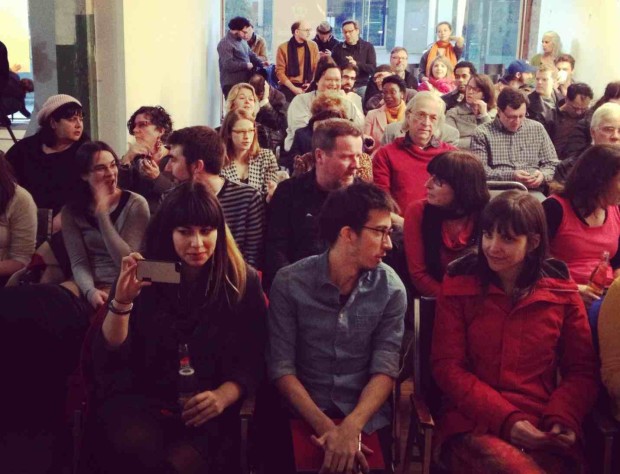#CivilDebates 2 Arts Boards: Results
Last night The Theatre Centre and Praxis Theatre held #CivilDebates 2: Arts Boards, examining the relationship between Arts Boards and Artistic Directors through debate of the resolution:
Be it resolved that Boards of Directors have the right and responsibility to overrule the Artistic Direction of a theatre company.
Arguing for the resolution was Theatre Centre Artistic Director Franco Boni and Buddies in Bad Times Theatre Artistic Director Brendan Healy.
Jini Stolk Creative Trust Research Fellow at the Toronto Arts Foundation, and Gideon Arthurs, General Manager of the Tarragon Theatre, argued against.
Here’s some of the arguments that were put forth as summarized on twitter:
#CivilDebates @francoaboni @praxistheatre– we don’t have problem with Boards but a problem with how we “End” relationships.
— FeverGraph Theatre (@FeverGraph) April 2, 2013
Jini Stolk – Governance defining collaboration process. Key areas are shared: Defining mission, why we exist, sustainability. #CivilDebates
— Praxis Theatre (@praxistheatre) April 2, 2013
@brendan_healy “fear of big business is not a fear that I have I fear the government is taking over arts” #CivilDebates @praxistheatre
— Theatre Centre (@TheatreCentre) April 1, 2013
Talks like these scare @brendan_healy because they risk demonizing boards #CivilDebates
— Carly Maga (@RadioMaga) April 2, 2013
.@gideonartaud term limits is a question in the community. should exist doesn’t always. #civildebates
— Praxis Theatre (@praxistheatre) April 2, 2013
Healy: If you’re part of a board and a concerted majority of board is feeling uncomfortable, chances are there’s a problem. #CivilDebates
— J. Kelly Nestruck (@nestruck) April 2, 2013
.@nightwsimming AD Brian Quirt – Resolution is good. Im voting Yay. Most boards in Canada too cautious don’t act quickly. #CivilDebates
— Praxis Theatre (@praxistheatre) April 2, 2013
. @instantravi asks “Is it the BODs responsibility to continue a company’s vision when the original visionary steps down?” #CivilDebates
— GetReddie (@msrenna) April 2, 2013
.@healeytypes: Can anyone describe a power structure where power is shared and doesn’t rest just with the board? #CivilDebates
— Praxis Theatre (@praxistheatre) April 2, 2013
That is, I’m increasingly of the opinion that Ken Gass was trying to build a subway on Sheppard. #CivilDebates
— Jonathan Goldsbie (@goldsbie) April 2, 2013
Boni: AD should always have their letter of resignation in their back pocket. #CivilDebates
— Glyn Bowerman (@Banquos_Banquet) April 2, 2013
Final “?” from long time board member. Wants to be more than “walking wallet and rolodex”. #CivilDebates
— Praxis Theatre (@praxistheatre) April 2, 2013
After the debate, there was a lot of continued discussion, as debaters and attendees hung out and continued conversations that could not be accommodated by the strict one minute, timed question-and-answer format that shaped the final section of the event.
We changed our voting format for #CivilDebates 2 Arts Boards:
Attendees were polled upon entering the debate as to their position on the resolution. The initial result was:
36 Yea – 10 Nay
After the debate, attendees also registered their position on the resolution as they left. The post-debate result was:
56 Yea – 9 Nay
What does this mean? First of all that some people don’t want to register an opinion if they are uncertain about a proposition. Also, there were more than 65 attendees, so some people don’t want to vote at all. Finally, it indicates that after hearing the debate and the discussion that followed afterwards, more people were swayed to vote in favour of the resolution.
Thanks to all who participated. It was a very *civil* event on what has been a contentious issue.




Recent Comments